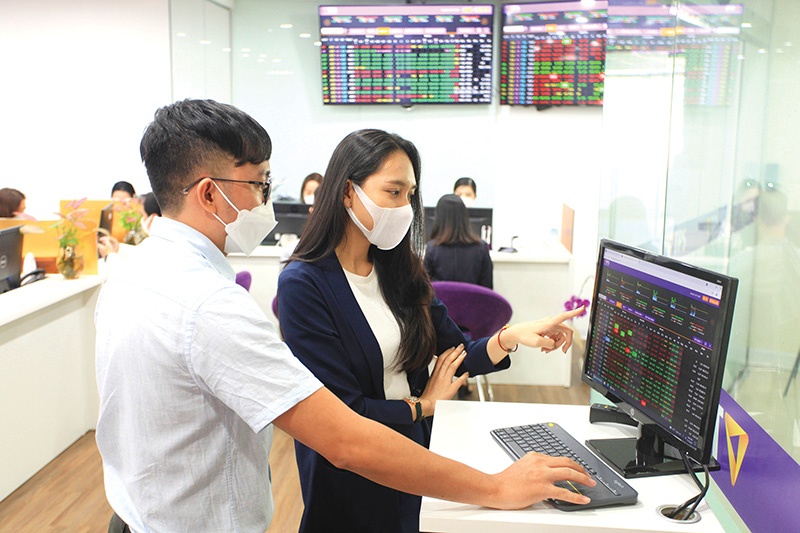Lenders explore new ways to up ownership
 |
| Since the beginning of the year, more than 30 securities companies have raised additional capital, Photo: Le Toan |
At the investor meeting of VPBank last week, deputy general director Luu Thi Thao revealed that the bank is mulling over establishing or acquiring a new securities company to tap into this lucrative sector, and increase cross-selling products for its large customer base.
| To mark the 25th birthday of the State Securities Commission of Vietnam (SSC) on November 28, Vietnam Investment Review, in partnership with the SSC, will organise an online seminar on the stock market in Vietnam. The seminar will take place on November 18 at 8:30-11:30am, with high-profile speakers and attendees from the Ministry of Finance, the SSC, major stock exchanges, listed companies, leading securities companies, and prominent fund management organisations. |
The bank did have a brokerage security (VPBank Securities Company) until 2015 when it unloaded 89 per cent of its stake.
Meanwhile, ASC Securities Corporation (ASCS) has recently moved its head office from Ho Chi Minh City to VPBank’s headquarters in Hanoi.
At its recent annual general shareholders’ meeting, ASCS elected the Board of Directors and Supervisory Board for 2021-2026, with both new members of the Supervisory Board, Nguyen Thi Duyen and Hoang Thi Quynh Trang, also holding positions at VPBank.
Along with a fresh capital raising and its renewed organisational structure, ASCS is rumoured to be closely linked with VPBank’s new stock trading project.
In the same vein, Viet A Bank is rumoured to have acquired National Securities Corporation (NSI). The brokerage company has just moved its headquarters to Viet A Bank’s head office.
NSI has also announced tripling its capital from $13 million to $43.5 million by issuing 70 million shares to existing shareholders in 2021.
Viet A Bank was also listed in the NSI’s offering plan as one of the purchasers. Cappella Group, one of the major stakeholder of NSI, is led by Nguyen Van Trong, member of the Board of Directors and acting CEO of Viet A Bank.
Earlier this month, Tien Phong Securities JSC (TPS) – the brokerage arm of TPBank – was officially listed on the Ho Chi Minh City Stock Exchange (HSX), with a reference price of VND28,300 ($1.23) apiece.
TPS, formally Phuong Dong Securities JSC, joined TPBank’s ecosystem in April 2019.
Tran Son Hai, vice chairman of the Board of Directors cum CEO of TPS stated, “Being listed on the HSX shows that we are part of a group of skilled and serious firms working to develop a transparent stock landscape for domestic and international investors alike. This also marks the success of our reorganisation, ushering in a new era of strong and remarkable growth with larger and more sustainable development.”
Hai also added that TPS aims to make it among the top 10 in Vietnam’s stock market in terms of size, market share, revenue, and profit to ensure operating efficiency and deliver the greatest advantages to shareholders.
Since the beginning of the year, more than 30 securities companies have raised capital. Some small-cap securities businesses that were of a low profile a few years ago have also emerged on the radar of deep-pocketed shareholders such as KS Securities, Dai Nam Securities, and DSC Securities.
Other brokerages backed by banks such as ACB Securities, MB Securities, and KS Securities have gained new momentum in the race for capital to intensify competitiveness. Techcom Securities JSC, VietinBank Securities, and Vietcombank Securities are also actively issuing bonds with support from their parent banks.
A securities subsidiary will support banks in the issuance of valuable papers, such as stocks and bonds, to mobilise much-needed capital.
Going against the flow, in late July Sacombank announced ambitions to offload its entire capital in Sacombank Securities JSC. The bank expects to gain around $6.5-7.4 million from the divestment. The move is part of the bank’s comprehensive restructuring strategy, including divestment from ineffective businesses. A representative of Sacombank noted that the bank had not been the parent company of Sacombank Securities JSC since 2011, after subsequent divestments in the preceding year.
| Nguyen Thi Hong-Governor, State Bank of Vietnam
Inflation has accelerated in recent months across the globe, including Vietnam. In early 2020 when the pandemic hit, the State Bank of Vietnam (SBV) had adjusted interest rates with three reductions at 1.5-2 per cent, a deep reduction compared to other countries in the region. In addition to regulating the interest rates of the central bank, the SBV has directed and called on domestic and foreign credit institutions to reduce interest rates for existing and fresh loans. The lending interest rate decreased by 1.66 per cent compared to the pre-pandemic level. The total reduction in interest rates of credit institutions reached $1.3 billion. The interest rate reduction will continue to be reduced from now until the end of the year. Commercial banks in Vietnam have actively slashed their interest rates by about $86.95 million to help customers ride out the bumps. However, the hotter-than-anticipated inflation has triggered heated debates over a rate hike. The monetary policy has two tasks in terms of progressively decreasing interest rates. The first is to manage the central bank’s policy in order to keep inflation under control and the economy stable. The second is the economy’s lifeblood, ensuring that the credit system functions in a way that assures people’s safety and payment ability. In order to determine if there is still room for further interest rate cuts when assessing the current situation of banking activities and the macro-economy, we assess that in 2021, we could meet inflation’s target of below 4 per cent, which is set by the National Assembly. By the end of October, inflation increased by 1.81 per cent. However, inflation risks are expected to be under pressure by 2022. Vietnam is not the only country facing great challenges posed by inflation. Inflation in developed nations, such as in the US, is starting to look unexpected and unwanted. Last week, the US government announced its consumer price index soared 6.2 per cent from a year ago – the biggest 12-month jump within three decades. Those signals would prompt more rapid tapering and faster rate hikes than expected. Many market participants are now expecting three rate hikes next year. With the openness of Vietnam’s economy and impressive import-export turnover, Vietnam bears the risk of import inflation. In addition, central banks across the globe are also adjusting their monetary policy, with 65 rate hikes worldwide. Therefore, inflation pressure and monetary policy operating pressure are large. Furthermore, bad debts in the system of credit institutions have also witnessed an upward trajectory. We previously dealt with the financial crisis in the 2008-2009 period. At the moment, the SBV would thoroughly assess the ongoing development on the inflation front, compare realistic scenarios for policy purposes, as well as come up with a flexible monetary approach. Throughout the pandemic, banks have used their own financial resources to lower interest rates. When soured debt grows, they must utilise their financial resources to cope with it. In the worst scenario, credit institutions’ weak performance would adversely impede the ability to pay people and the safety of the whole system. This is an unforgettable lesson from the past when credit growth skyrocketed uncontrollably when we facilitated interest rate support packages in 2010. If not calculated carefully, there is a risk that inflation will return to the same level as in 2011, at around 18 per cent. As a result, the SBV would continue to ramp up efforts to cut operational expenses in order to lower interest rates, but also ensure the stability of the credit institution system. Simultaneously, we will continue to coordinate with relevant ministries and agencies to determine fair interest rates in support packages based on macroeconomic stability and inflation risk mitigation. |
What the stars mean:
★ Poor ★ ★ Promising ★★★ Good ★★★★ Very good ★★★★★ Exceptional
Related Contents
Latest News
More News
- Private capital funds as cornerstone of IFC plans (February 20, 2026 | 14:38)
- Priorities for building credibility and momentum within Vietnamese IFCs (February 20, 2026 | 14:29)
- How Hong Kong can bridge critical financial centre gaps (February 20, 2026 | 14:22)
- All global experiences useful for Vietnam’s international financial hub (February 20, 2026 | 14:16)
- Raised ties reaffirm strategic trust (February 20, 2026 | 14:06)
- Sustained growth can translate into income gains (February 19, 2026 | 18:55)
- The vision to maintain a stable monetary policy (February 19, 2026 | 08:50)
- Banking sector faces data governance hurdles in AI transition (February 19, 2026 | 08:00)
- AI leading to shift in banking roles (February 18, 2026 | 19:54)
- Digital banking enters season of transformation (February 16, 2026 | 09:00)


 Tag:
Tag:



















 Mobile Version
Mobile Version